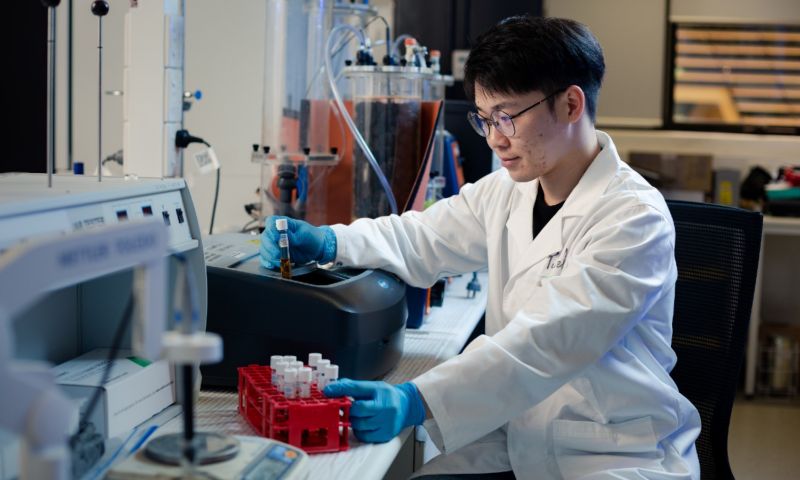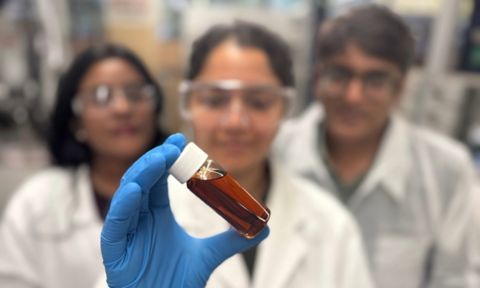VISUAL: Chemical Engineering. David Amy talks about what it’s like to study at RMIT. RMIT University logo.
VISUAL: David Amy speaking to the camera.
David Amy: I always had a passion for chemistry and Chemical Engineering ...
VISUAL: Close up of David Amy’s hand pouring water from a jug into a beaker which is set up on what looks like a stirring machine.
David Amy: ... seemed like the practical application ...
VISUAL: David Amy turning a dial on a stirring machine. He is wearing a lab coat and safety glasses.
David Amy: ... of that knowledge. It was a combination of ...
VISUAL: David Amy speaking with an unidentified male student, they are both wearing lab coats and safety glasses.
David Amy: ... logic and science and ...
VISUAL: Three videos on one screen. The video on the left is of David Amy speaking to the camera. The video on the top right is of David Amy and a fellow male student wearing lab coats and safety glasses and looking at something which is off?screen. The bottom right video is a close up of a four different coloured cables coming out of an electronic box.
David Amy: ... business skills and management ...
VISUAL: Video of the same unidentified male student looking at a computer screen with the image of a graph on it. The camera is looking over his right shoulder.
David Amy: ... sort of all go towards ...
VISUAL: Video of David Amy and the unidentified male student, side on to camera, speaking together whilst looking at the computer screen. David Amy points at the screen.
David Amy: ... solving real?world problems.
VISUAL: Three videos on one screen. Video on top left of screen is of David’s hand pouring and tapping a small amount of a powdered substance from a small container into the top of a machine (name unknown). Video on the bottom left is of David Amy and the unidentified male student working beside each other in the lab and looking at something off?screen. The video on the right side of the screen is of David Amy speaking to the camera.
David Amy: RMIT had the best range of relevant degrees ...
VISUAL: Three videos on one screen. Video on top left of screen is of students walking on RMIT’s city campus along Bowen Street, the entrance to RMIT’s Building 2 is in the background. Video on the bottom left is of the University Lawn at RMIT’s city campus with a path and bench seating beside the path leading to a café at the back of a rotunda?shaped building which is part of the historic Francis Ormond Building (Building 1). The video on the right side of the screen is of David Amy walking across the lawn of the Alumni Courtyard which is part of RMIT’s campus - the Old Melbourne Gaol (off Russell Street). In the background is the old brick wall and entrance way to the Gaol and tall city buildings, trees and other people walking on the path around the lawn.
David Amy: ... and the CBD location was really attractive to me.
VISUAL: Three videos on one screen. The two videos on the left top and bottom are of David Amy smiling at the camera and glancing around the room. The image on the right of the screen has white text written on a red background and reads: What do you like most about your degree?
VISUAL: Three videos on one screen. The video on the left is of David Amy speaking to the camera. The video on the top right is of David Amy putting on his safety glasses and looking down at the camera. The bottom right video is of David Amy and the unidentified male student standing beside and looking at the stirring machine. David is adjusting a dial on the top front of the machine.
David Amy: The various chemical labs and the various engineering labs ...
VISUAL: Close up of the stirring machine’s rod spinning in a beaker of liquid.
David Amy: ... everything from mixing things and ...
VISUAL: Close up of a machine in the engineering lab with a perspex safety cover over it (name unknown).
David Amy: ... making smells and colours to ...
VISUAL: Close up of a drill bit turning, possibly this is the top part of the spinning stirring rod but the rest of the machine is off?screen.
David Amy: ... playing with drill motors ...
VISUAL: David Amy and the unidentified male student wearing lab coats and safety glasses are standing together and looking at a computer screen. Next to the computer screen, the mixing machine’s rod is spinning. The camera is behind the back of the computer screen.
David Amy: ... and heat exchanges.
VISUAL: Three videos on one screen. The video on the left is of David Amy speaking to the camera. The video on the top right is of David Amy wearing a lab coat and safety glasses sitting at a desk and looking at a computer screen Camera is close up and right side on to him. The bottom right video is of David Amy sitting and looking at his computer screen. The camera is further back and left side on to him.
David Amy: Learn fluid mechanics, learn ...
VISUAL: Three videos on one screen. The video on the left is of David Amy speaking to the camera. The video on the top right is of a metal top spinning in a machine (name unknown). The bottom right video is of a machine with a rod which looks like a drill bit spinning (name unknown).
David Amy: ... thermodynamics, material properties.
VISUAL: Machine with the rod which looks like the drill bit spinning but now as camera is further back the video shows the left and right wing of the machine which could be some sort of heat conductor.
David Amy: You can combine ...
VISUAL: Close up of a tube in the lab which has electronic nodules every inch all the way around and up the tube. Each nodule has a cable coming off of it and there are four large black cables around the front of the equipment.
David Amy: ... scientific know?how ...
VISUAL: David Amy speaking to the camera.
David Amy: ... with engineering instinct.
VISUAL: Three videos on one screen. The image on the left of the screen has white text written on a red background and reads: Labs or lectures? The two videos on the right top and bottom are of David Amy smiling at the camera and glancing around the room and back at the camera.
VISUAL: Three videos on one screen. Video on top left of screen is of David Amy wearing a lab coat and safety glasses and putting on some heavy duty gloves. Video on the bottom left is of David Amy wearing the gloves and opening the door of a machine in the lab which looks like a small oven. A sign above the machine reads: Spill Control Station. The video on the right side of the screen is of David Amy speaking to the camera.
David Amy: You’ve got to love the labs; I mean ...
VISUAL: Two videos on one screen. Video on left of screen is of David Amy putting on his lab coat. The video on the right side of the screen is of David Amy speaking to the camera.
David Amy: ... you chuck your coat on and you get ...
VISUAL: Three videos on one screen. Video on top left of screen is a close up of David’s hands opening a screw top lid on a small container. Video on the bottom left is of David Amy buttoning up the front of his lab coat. The video on the right side of the screen is of David Amy pouring a liquid into a machine in the lab. The unidentified male student is watching and standing beside him.
David Amy: ... out there and you go and do stuff ...
VISUAL: Close up as camera pans from David Amy’s face down to the machine as he places the small container on top of it. David is wearing the safety glasses and lab coat and he is looking at the machine.
David Amy: ... you know, and that’s what it’s all about.
VISUAL: Three videos on one screen. The image on the left of the screen has white text written on a red background and reads: What advice do you have for future students? The video on the right top is of David Amy glancing around the room and looking down but not at the camera. The video on the bottom right is of David Amy smiling at the camera.
VISUAL: David Amy speaking to the camera. Camera pans back to reveal this video image in the centre of eight other video images of David Amy. Each of these eight video images surrounding the one of him speaking to the camera are of him changing his head position, facial expression, and making funny faces and poses at the camera. At the end the camera pans back on the video in the centre of David speaking to the camera.
David Amy: Get a really good student photo ‘cause you’re stuck with it for a while (chuckling).
VISUAL: Three videos on one screen. The two videos on the left top and bottom are of David Amy smiling at the camera. The image on the right of the screen has white text written on a red background and reads: So what’s next for you?
VISUAL: Three videos on one screen. Video on top left of screen is of David Amy in the lab looking down at something off screen. The unidentified male student is standing beside him and only a part of his face is on screen. Video on the bottom left is a close up of one of the machines in the lab with the safety Perspex cover over it. The video on the right side of the screen is of David Amy speaking to the camera.
David Amy: Well, hopefully I will graduate; to start.
VISUAL: Three videos on one screen. The video on the left is of David Amy speaking to the camera. The video on the top right is of David Amy and the unidentified male student looking together at the computer screen. The bottom right video is a close up of the side of David Amy’s face (left eye, nose and forehead) whilst wearing safety glasses.
David Amy: Dream job? I’d say probably either running a chocolate factory ...
VISUAL: Video of David Amy speaking to the camera as per previous left of screen, transitions across to fill the entire screen (ie the smaller videos on the right have transitioned off the screen). David Amy smiles and nods to the camera at the end.
David Amy: ... or running a brewery; that would be great.
VISUAL: RMIT University’s logo and website www.rmit.edu.au.
End of video









